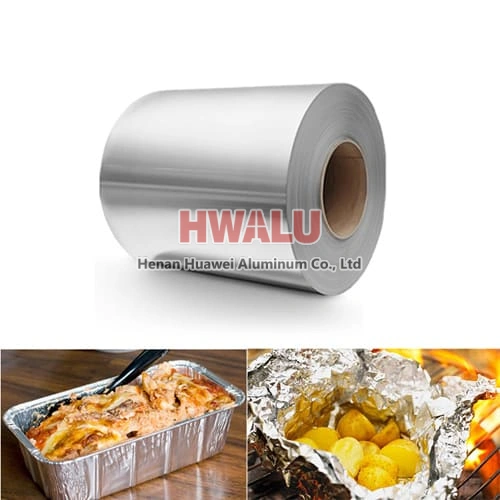what is Aluminum foil for capsule packaging? Compared with traditional capsule packaging materials, aluminum foil for capsule packaging has better moisture-proof, anti-oxidation and fresh-keeping properties, which can better protect the quality and safety of medicines. Reasons for choosing aluminum foil for capsule packaging Good moisture-proof performance: prevent the medicines in the capsules from moistu ...
What Is Food Packaging Aluminium Foil Roll 8011 As we all know, aluminum foil is widely used in our daily life, especially in the field of food packaging. Aluminum foil roll 8011 is a common food packaging material. 8011 aluminum alloy is a high-quality aluminum alloy with good ductility, strength and corrosion resistance. This type of aluminum foil is commonly used for food packaging. 8011 aluminum fo ...
what is Cold forming alu alu foil? Cold forming blister foil can absolutely resist vapor, oxygen and UV rays with good performance of aroma barrier. Each blister is a single protection unit, no effect to barrier after opening first cavity. Cold forming foil is suitable to pack drugs that easy to be affected in wet regions and tropics. It can be shaped in various appearance by changing stamping mold. Simultane ...
What is 1050 H18 aluminum foil 1050 H18 aluminum foil is an aluminum foil material with high purity and good mechanical properties. Among them, 1050 represents the grade of aluminum alloy, and H18 represents the hardness level. 1050 aluminum alloy is an aluminum alloy with a purity of up to 99.5%, which has good corrosion resistance, thermal conductivity and machinability. H18 represents the aluminum foil aft ...
What is Aluminum Foil for Pans Aluminum foil for pans is usually thicker and stronger than typical kitchen foil to withstand high heat and stress. Aluminum foil for pans can be used to cover the bottom of pans to keep food from sticking to them, and to make liners for steamers and bakeware to prevent food from sticking to the bottom or to the pan. The use of aluminum foil for pans is similar to that of ordina ...
Aluminum foil is often used in our daily life, especially when we use microwave oven to heat food quickly. Can aluminum foil be used in microwave oven? Is it safe to do this? Please pay attention to the difference of microwave oven function, because different function mode, its heating principle is completely different, and the utensils used are also different. Now the market in addition to the microwave oven ...
What is the difference between aluminum foil and tin foil? Can it be used for oven heating? Is aluminum foil toxic when heated? 1. Different properties: Aluminum foil paper is made of metal aluminum or aluminum alloy through rolling equipment, and the thickness is less than 0.025mm. Tin foil is made of metal tin through rolling equipment. 2. The melting point is different: the melting point of aluminum foil ...
It is generally believed that the single-sheet rolling speed of the aluminum foil should reach 80% of the rolling design speed of the rolling mill. Danyang Aluminum Company introduced a 1500 mm four-high irreversible aluminum foil roughing mill from Germany ACIIENACH. The design speed is 2 000 m/min. At present, the single-sheet aluminum foil rolling speed is basically at the level of 600m/miT, and the domestic s ...
Aluminum foil is typically thinner than aluminum coil. Aluminum foil is typically available in various thicknesses, ranging from as thin as 0.005 mm (5 microns) up to 0.2 mm (200 microns). The most commonly used thicknesses for household aluminum foil are around 0.016 mm (16 microns) to 0.024 mm (24 microns). It is commonly used for packaging, cooking, and other household purposes. On the other hand, alumin ...
Can aluminum foil be used to wrap chocolate?Aluminum foil can be used to wrap chocolate, thanks to its properties. In fact, aluminum foil packaging of chocolate is a common and practical method of packaging and preserving chocolate. Aluminum foil is suitable for packaging chocolate for the following reasons: Barrier properties: Aluminum foil effectively blocks moisture, air, light and odors. Helps protect c ...
What is PE PE refers to polyethylene (Polyethylene), which is a thermoplastic obtained by polymerization of ethylene monomers. Polyethylene has the characteristics of good chemical stability, corrosion resistance, insulation, easy processing and molding, and excellent low-temperature strength. It is a common plastic material widely used in industry and daily life. According to different preparation methods, p ...








